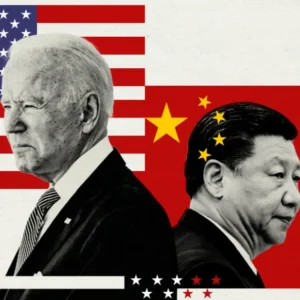 The United States has imposed punitive measures on three Chinese corporations in a pivotal maneuver aimed at bolstering non-proliferation endeavors and safeguarding the sanctity of national security. These sanctions stem from their involvement in the provision of critical components for ballistic missiles destined for Pakistan, underscoring the intricate terrain of international relations and the unwavering commitment of the United States to curtailing the dissemination of missile technology.
The United States has imposed punitive measures on three Chinese corporations in a pivotal maneuver aimed at bolstering non-proliferation endeavors and safeguarding the sanctity of national security. These sanctions stem from their involvement in the provision of critical components for ballistic missiles destined for Pakistan, underscoring the intricate terrain of international relations and the unwavering commitment of the United States to curtailing the dissemination of missile technology.
U.S. Concerns About Missile Proliferation
The expansion of missile technology has consistently been a source of profound concern for the United States. Ballistic missiles, endowed with the capability to carry nuclear warheads, represent a significant menace to the global equilibrium of security. The transfer of missile technology to entities with a propensity for misapplication imperils regional stability and international peace and security. Pakistan, a nation possessing nuclear armaments, which has continually occupied a central role in these discussions, is of particular apprehension.
China’s Complicity in Missile Technology Propagation

China’s involvement in the proliferation of missile technology has come under growing scrutiny in recent years. A series of incidents have cast doubt on the extent to which China and Pakistan cooperate in the development and acquisition of missile technology. While China has consistently asserted the benign nature of its collaboration with Pakistan, the United States and other global stakeholders have expressed reservations.
The Sanctioned Chinese Entities
- General Technologies Group Inc.: This Chinese corporation stands accused of playing a pivotal role in the supply of missile components to Pakistan, raising significant apprehensions about the augmentation of Pakistan’s ballistic missile capabilities.
- AMI (Advanced Materials Industry) Co., Ltd.: AMI, a Chinese firm, has faced intense scrutiny for its alleged involvement in the provision of critical materials and technology employed in Pakistani missile production.
- Xi’an Fangyuan Science and Technology Co., Ltd.: Another Chinese enterprise has incurred sanctions from the United States following allegations of facilitating the transfer of missile components to Pakistan, consequently engendering a substantial security risk in the region.
Security Implications for South Asia
The provision of missile components to Pakistan engenders concerns regarding the security dynamics of South Asia. With its nuclear arsenal, Pakistan plays a pivotal role in regional geopolitics. The reinforcement of its ballistic missile capabilities holds the potential to exert a profound influence on the equilibrium of the region. This action by the United States is perceived as a resolute endeavor to preserve the power balance in the region, averting the escalation of tensions.
Implications for U.S.-Pakistan Relations
The imposition of sanctions upon these Chinese corporations further complicates an already intricate relationship between the United States and Pakistan. Despite collaborative efforts in various domains, including counterterrorism, concerns regarding nuclear and missile capabilities have persistently exacerbated tensions. It is imperative to emphasize that these U.S. sanctions are not explicitly directed at Pakistan but rather at Chinese corporations found to be complicit in facilitating the augmentation of Pakistan’s missile technology. This approach enables the United States to address its concerns regarding missile proliferation while simultaneously upholding its broader diplomatic relations with Pakistan.
Global Non-Proliferation Endeavors
The international community has long been dedicated to constraining the dissemination of missile technology, particularly technology capable of transporting nuclear warheads. Various arms control treaties and pacts, including the Missile Technology Control Regime (MTCR), have been established to impede the proliferation of such technology. The imposition of sanctions by the United States upon these Chinese corporations aligns with the overarching global objective of preventing the spread of missile technology to unstable regions.
China-Pakistan Collaboration
China and Pakistan have a protracted history of cooperation in a multitude of fields, encompassing defense and technology. While both nations affirm that their collaboration is driven by peaceful objectives, concerns have been voiced regarding the unintentional contribution of this collaboration to the dissemination of sensitive technologies. The sanctions levied against these Chinese corporations underscore the significance of transparency and adherence to international non-proliferation norms.
China’s Response
In response to the sanctions, China has unequivocally expressed its opposition and implored the United States to reconsider its actions. Chinese officials have reiterated that their partnership with Pakistan aligns with international agreements and exemplifies China’s unwavering commitment to peaceful development.
Conclusion
The imposition of sanctions upon three Chinese corporations involved in supplying ballistic missile components to Pakistan marks a watershed moment in the realm of global non-proliferation endeavors and the intricate relations between the United States and Pakistan. While the United States has voiced its concerns regarding the proliferation of missile technology, it remains imperative to sustain diplomatic channels for dialogue and engagement with both China and Pakistan.
International non-proliferation norms and agreements persist as the linchpin in ensuring regional stability and global peace. These sanctions serve as a poignant reminder of the complexities and quandaries inherent in balancing national security, diplomatic relations, and global equilibrium in a world where the dissemination of sensitive technology carries far-reaching implications. The international community will vigilantly monitor the unfolding developments in this ongoing narrative.










